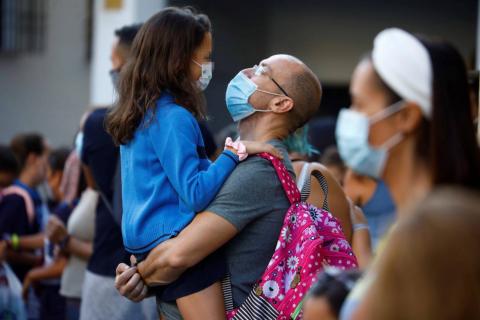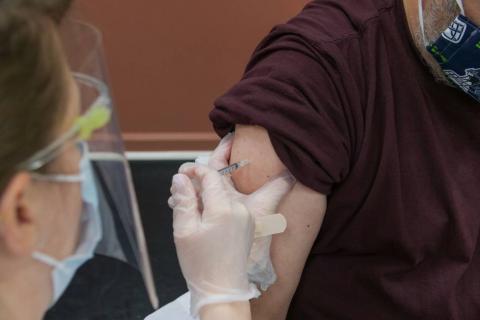Anti-vax vaccination does not affect the success of assisted reproduction or the ability to conceive naturally: expert reaction
Several results confirm that vaccination against covid-19 does not affect fertility. One of them, carried out on some 2,000 couples and published in the American Journal of Epidemiology, compares the ability to conceive naturally in vaccinated and unvaccinated couples. The other, in Obstetrics & Gynecology, studies some 1,300 vaccinated and unvaccinated women who have used different assisted reproductive techniques. Neither paper finds a link between vaccination and pregnancy.

Clinical trials on these vaccines published so far confirm their safety and health authorities recommend their use. / Adobe Stock.
Rita Vassena - vacunas reproducción EN
Rita Vassena
Medical Director of Fertility at CooperSurgical
Data on natural pregnancies among participants in vaccine clinical trials have been very reassuring from the outset, as pregnancies have been found to occur with the same frequency in both the vaccine and control groups. Moreover, no relevant deviations between pregnancies in vaccinated and non-vaccinated populations have been reported. This suggests that the vaccine does not negatively affect fertility.
However, pregnancies resulting from assisted reproduction techniques allow us to analyse reproductive details that are beyond the scope of epidemiological studies, such as how the ovary responds to reproductive hormones, if there are alterations in egg quality, if there are very early gestational losses (these losses go unnoticed in population-based studies because the pregnancy is interrupted in the first 2-3 weeks, before it is even recognised as such).
These details, which are discussed in the study by Aharon and colleagues, confirm and extend the evidence already available: there is no evidence that the vaccine has negative effects on fertility, even in a reproductively fragile population such as assisted reproduction patients.
The data available to the medical and scientific community since the beginning of mass vaccination programmes have always pointed to the fact that the vaccine does not affect fertility. However, it is important to continue to study this issue and confirm the data, as unfortunately there is still some resistance among those who are considering pregnancy, or who are already pregnant, to be vaccinated.
This reluctance is due to several factors, such as the lack of inclusion of pregnant women in vaccine clinical trials (which has been filled by real-world data once vaccination has become widespread), and the presence of transient menstrual cycle disturbances in many women after vaccination. This study adds to the evidence we have, and reinforces the indication to vaccinate.
It is worth remembering that while the vaccine does not affect fertility or pregnancy outcomes, developing covid-19 does carry an increased risk of hospitalisation in pregnant women, as well as a more severe course of the disease. New evidence indicates that covid-19 is also associated with ongoing pregnancy loss.
In summary, we see no adverse effects of the vaccine on the reproductive function of women, and it is important to be vaccinated to protect both mother and baby from severe forms of the disease.
Anna Lisa Racca - vacunas reproducción EN
Anna Lisa Racca
Specialist in Reproductive Medicine
Both studies confirm the safety of vaccination in young women. Interestingly, both studies look at the entire cohort of women of reproductive age. The first focuses on fertile couples, while the second focuses on infertile couples undergoing the two most commonly used techniques: ovarian stimulation and frozen embryo transfer. By looking at the entire cohort of women in the two studies we have a holistic view on safety for each woman at any level of the reproductive process (spontaneous or medicalised). Both studies are well designed, the statistical analysis is rigorous, the results are reliable and the discussion gives a clear view on possible explanations for the results recorded.
I believe that this type of evidence is strong enough to get the message across: the best option is to get vaccinated, regardless of the planned family plan.
The study in Obstetrics & Gynecology is a very large prospective cohort study. It investigates the possible association between vaccination against covid-19 and SARS-CoV-2 infection with fertility in couples trying to conceive spontaneously. It uses data from an internet-based preconception cohort study (PRESTO). Vaccination was not appreciably associated with fertility in either partner.
SARS-CoV-2 infection in the male partner was associated with a short-term decrease in fertility, which could be prevented by vaccination. Therefore, considering the known risks of SARS-CoV-2 infection during pregnancy for maternal and foetal health, and the evidence presented that there is no detrimental association with fertility, the results support vaccination against covid-19 in the preconception period.
The study in the American Journal of Epidemiology is a retrospective cohort study to determine whether there is any association between covid-19 mRNA vaccination and successful ovarian stimulation and embryo transfer. The comparison was made between fully vaccinated and unvaccinated patients who cycled during the same time period. Fertilisation rate (for ovarian stimulation) and clinical pregnancy rate (for frozen-thawed embryo transfer) were assessed first. There was no association in the adjusted analysis between covid-19 vaccination and fertilisation rate (or any of the secondary outcomes investigated), and no association between covid-19 vaccination and clinical pregnancy or any of the secondary outcomes analysed. Thus, the results of the present study contribute to the growing body of evidence regarding the safety of covid-19 vaccination in young women of reproductive age.
Aharon, Devora et al.
- Research article
- Peer reviewed
- Observational study
- People
Amelia K Wesselink et al.
- Research article
- Peer reviewed
- Observational study
- People



